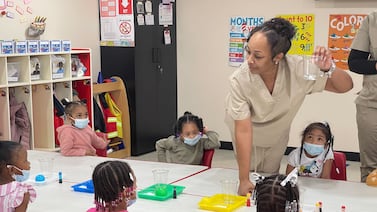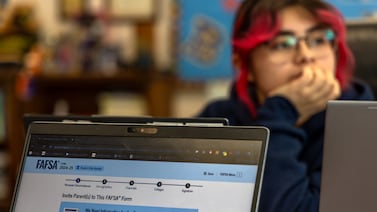In an effort to save students’ lives and restore parents’ trust, Philadelphia is expanding the district’s use of weapons screening equipment in middle schools, updating surveillance cameras, and piloting drones to watch over school grounds.
The district is also extending its Safe Path program to nine new schools. The program pays adults in neighborhoods to patrol areas where students walk to and from school.
“Despite all of the things that you’ve seen across the city, and we’ve had some tragedy, our schools are the safest places for our kids to be,” Kevin Bethel, the district’s chief of school safety, said in a Wednesday press conference. “It is our job as adults to make sure we make it as safe as possible for them.”
Though law enforcement officials have said shootings in the city have declined this year compared to the same period in the prior year, gun violence has become an inescapable reality for students and young people in Philadelphia.
Nearly 200 students were shot during the previous school year and 33 young people died, according to the district. Eighteen guns were recovered from students in the district last school year, Bethel said.
This year, Bethel, outgoing Mayor Jim Kenney, Philadelphia Superintendent Tony Watlington, and Board of Education President Reginald Streater said they’ll do “everything we can” to ensure student safety. But Kenney said because guns are so easy to come by in Pennsylvania, safety challenges will likely persist this school year.
“Until we get our arms around this commonwealth’s issues relative to the availability of guns we’re still going to be running uphill,” Kenney said. “Everybody seems to have a gun.”
The city’s young people seem to share that sentiment. At a gun violence roundtable in early August, one student told Chalkbeat she felt like “no matter how hard you try to fix something that’s so constant, it’s never ending.”
The Philadelphia district’s school year begins Sept. 5. Here is what the district and city say they will do this year:
— Continue to hire crossing guards to patrol heavily trafficked school areas. So far, the city has assigned 650 crossing guards to schools across Philadelphia, and the city is still accepting applications, officials said.
Become a Chalkbeat sponsor
— Update 150 analog cameras to digital cameras over the next three years and merge the cameras’ monitoring systems with those of the city government. Watlington has pledged this update as part of the district’s five-year strategic plan.
— Introduce new “minimally invasive gun detection systems” in 14 middle schools. Those systems will appear as two stanchions in school doorways that students must walk through, rather than a full standup metal detector or wand.
Students won’t have to take off their backpacks, or send their personal belongings through a conveyor belt like at the airport, to pass through these systems, Bethel said. In previous years, parents, students, and teachers have expressed concerns that metal detectors could make students feel like criminals. Bethel said these new “less intrusive” detectors were chosen because district officials were looking for technology “that did not add to the trauma of our young people.”
— Expand the Safe Path program from 13 schools to 22 schools in partnership with the University of Pennsylvania. Those programs will come online incrementally, Bethel said, as community groups “get on board” with staffing, security clearances, and vetting through Penn. Though maintaining consistent staffing for these programs was challenging when they launched in 2022-23, Bethel said he hopes they will be fully staffed this school year.
— Launch district-owned drones, in some cases piloted by students. Bethel said the district is still in the early stages of planning for drones, but they are looking into expanding the use of drones to patrol violence-prone areas without the need for police on the ground. Bethel said he’s aware of concerns about increasing student and city resident surveillance, but said “the core purpose” of using them would be to “make sure that I’m keeping my children safe. There’s no ulterior motive to try to look for.”
Bethel said students would not monitor the drone footage, however, as the idea of students surveilling other students is highly controversial.
“We don’t want to put kids in a position where their … peers could construe it to be something negative,” Bethel said.
— Increase participation in the city’s many out-of-school-time programs. These include homework help, field trips to ice skating rinks and museums in and around Philadelphia, peer mentoring programs, and community-based prevention programs for youth who have been impacted by violence.
— Increase Philadelphia police presence in and around schools using a new $600,000 grant. At Wednesday’s press conference, Police Commissioner Danielle Outlaw did not give an estimate for how many officers this would pay for.
— Train all district employees in ALICE active shooter response training; ALICE stands for Alert, Lockdown, Inform, Counter, and Evacuate. This comes after school staff expressed concern that their prior training was inadequate, and Watlington and the school board committed nearly $1 million to upgrade their approach.
Become a Chalkbeat sponsor
Carly Sitrin is the bureau chief for Chalkbeat Philadelphia. Contact Carly at csitrin@chalkbeat.org.







